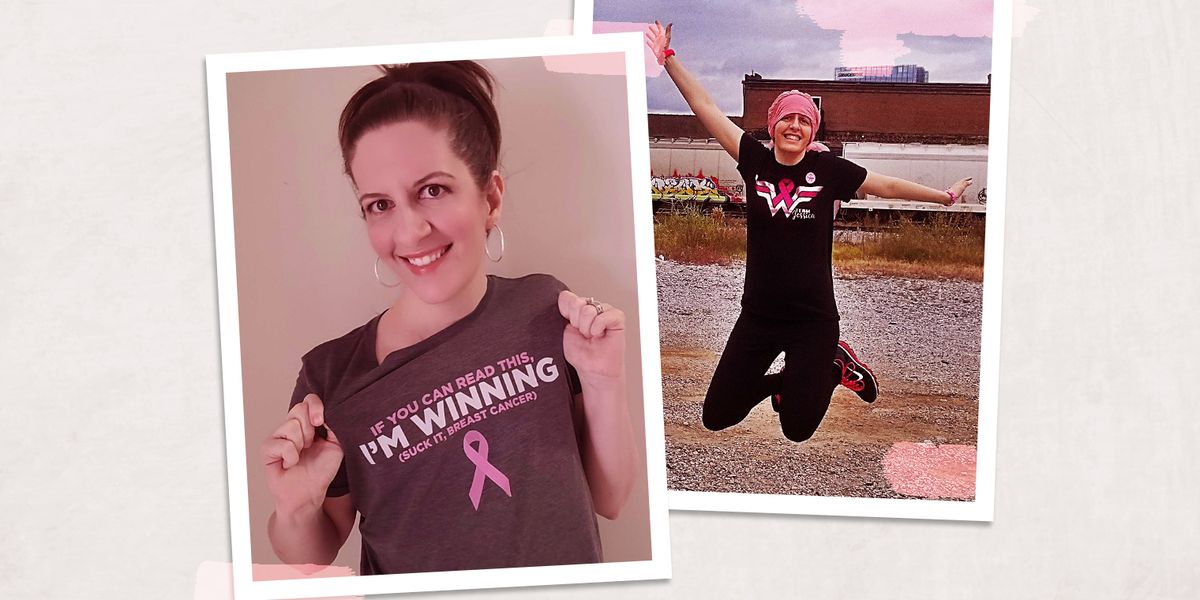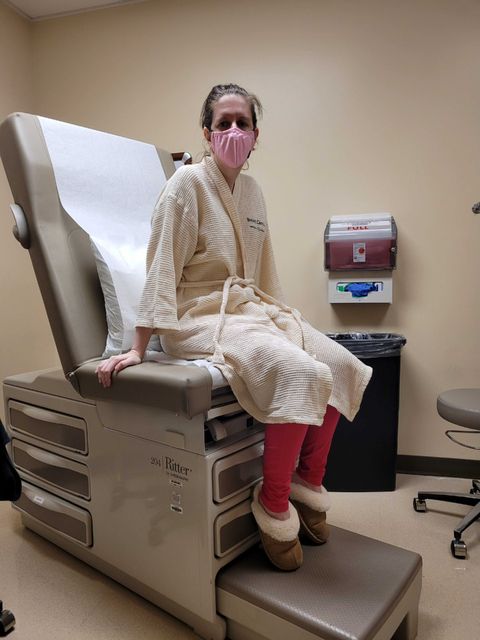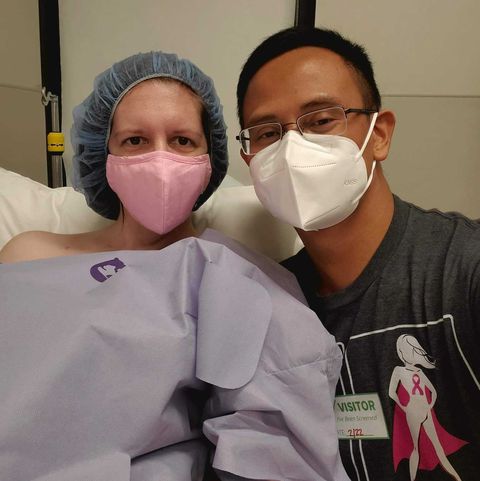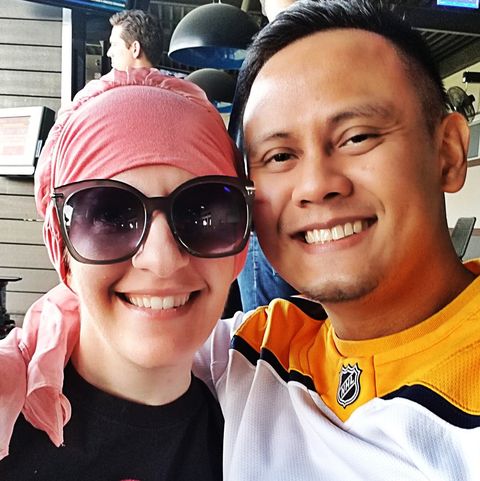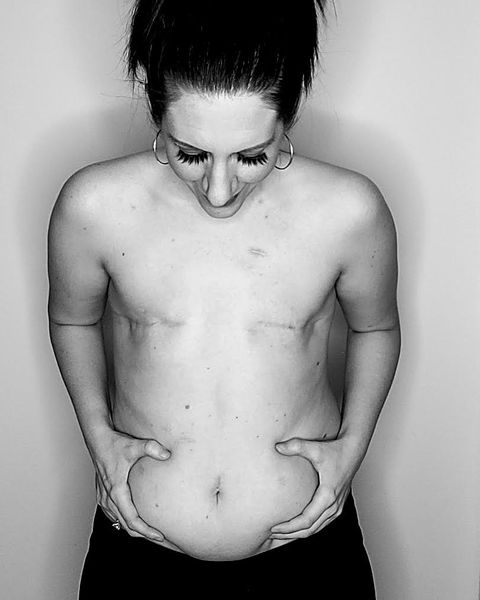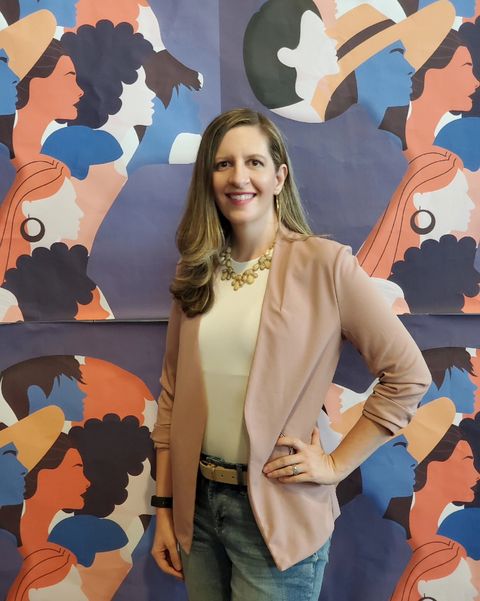Editor’s note: This interview was made possible through the community at Peanut, a female-only social network designed for women trying to conceive, in all stages of motherhood as well as those entering menopause.
My breast cancer journey began when I was soaking wet and naked. At 18 years old, I found a lump beneath my left breast while I was in the shower. Breast cancer had already ravaged my family, so I immediately visited my gynecologist, who said it was just a cyst. Months later, in the midst of my freshman year at college, the lump became more painful. At that point, the lump was diagnosed as a fibroadenoma, a common non-cancerous lump, and I thought I was in the clear.
More than a decade later, I found another lump. Despite my frantic Googling, I felt confident that this one was nothing to worry about, either: I had no dimpling, no puckering and zero discharge. I pushed it out of my mind for the time being.
That summer, I noticed I was getting tired easily and taking really long naps. I remember thinking, “Wow, being in my 30s is exhausting. Is this what it’s like to get old?”
Then, I realized maybe there was something more to the fatigue. Scrolling through Snapchat one day, I saw a story from my sister’s friend, who was just a year older than me — she was shaving her head. Soon, I found out that she had breast cancer and was about to start chemotherapy. That made me worry about the lump I had recently discovered and how tired I’d been.
At the clinic, a doctor checked my breast, but didn’t really say much. Her nurse came and told me I would be getting a mammogram.
I asked the doctor if she thought the lump indicated cancer. “All I know is that it’s a lump, and that’s why we need further imaging,” she said. Then, she looked at me and said something I’ve never heard a practitioner tell me ever, “No matter what happens, God is going to use you through this.”
At that point, I panicked. You don’t need God to see you through sniffles or a UTI. I knew it was serious. Then, she said, “Can I pray for you?” I’m a Catholic woman who lives in the South, and my faith is very important to me. So I told her to go ahead and pray for me. We were both in tears.
After I got a mammogram, I was immediately referred for an ultrasound. The radiologist in the room said, “I’m not going to sugarcoat this. I’ve seen this before. I’m pretty sure it’s cancer.” He asked me to come back to the hospital the next morning for a biopsy, which confirmed that I had breast cancer. I had kept my lump hidden from almost everyone because I was losing an aunt to breast cancer at the time. I didn’t want to worry anyone or cause any more pain in anyone’s life. I had everybody meet me at my dad’s house and I relayed the story of how I got here.
‘I felt pressure to save my ovaries’
After I broke the news with my family, I sat down with my oncologist to talk about my treatment options and family planning with my husband. Though I wasn’t labeled high risk by a doctor, I wanted everything — my breasts, my ovaries, my uterus, my fallopian tubes — to go. I saw my reproductive organs as another opportunity for my body to betray me and I needed a fresh start. I’ve seen cancer spread through my family. It doesn’t just run; it sprints.
Even though a gene mutation that predisposes someone to cancer hasn’t been discovered in my family, my medical teams are certain that genetics play a role. I inherited breast cancer from my dad’s side of the family and because of that, I knew I didn’t want to pass this down to another child. Still, we initially took steps to save my ovaries. I’m Catholic, living in Tennessee, and my husband, Neil, comes from a large Filipino family. We were always expected to have children.
Every month during chemo, I was injected with medications to put my ovaries to sleep until I completed treatment. A few months later, I decided to have a hysterectomy after my oncologist said my body could actually overpower this shot which put me at risk for more cancer.
After all was said and done, I had 16 rounds of chemo, 24 rounds of radiation, a double mastectomy, a hysterectomy and a two-phase, 12-hour flap reconstruction, where they took fat tissue and blood vessels from my abdomen and placed them in my chest to reconstruct my breasts.
For at least another two years, I’ll be on a chemo pill called Anastrozole, and it could be extended up to another seven years. I’m in remission and there’s no evidence of cancer. But, I’m in menopause. I feel like my body has aged 10 years through my cancer treatment.
‘I felt a lot of guilt after my hysterectomy’
I feel like we’re part of a culture that has a lot of opinions about a woman’s reproductive system, and my church sees a woman’s body as the epicenter of life. After going through cancer and a hysterectomy, I started to see my reproductive organs differently, as part of my body that only I get to control.
Still, when I decided to have the hysterectomy, I felt so much guilt. It was so ingrained in me by my Catholic faith to have children, and we had planned to start a family eventually. But, I also don’t want to pass this breast cancer gene down to my children. I don’t want my body to breed more cancer for others.
A few years ago, my husband and I talked to our priest and he asked about our interest in having kids. At that point, I was 30 with a whole world in front of me that didn’t involve cancer. We just left it open and said we planned to wait at least five years to give us time for our marriage, and the priest agreed that was a great idea.
No one from the church directly said anything to me about the hysterectomy and no longer being able to have children, but family members brought it up.
Just after my cancer went into remission but before I had the hysterectomy, someone asked, “So when are you two going to start having kids now?” The question frustrated me. I said, “Well, let me get through the first few years of survivorship and being in remission and we’ll play it by ear.”
I created an app to help women with self-breast exams
As I shared my story about breast cancer and treatment, I realized women aren’t talking about their breasts and I wanted to do something about it.
I started a social media project, Feel for Your Life, on Facebook and Instagram, where I talk about the importance of self-breast exams
In 2020, during the pandemic, I started developing an app to help women do a self-breast exam at home, and to share tools to learn more about advocating for your breasts.
The Feel for Your Life app launched in August. I talked about it on Facebook and Instagram, and interest grew. Local media outlets contacted me, and then it just took off. I was even on Good Morning America. I’m really proud of it.
It’s been really great hearing from so many women saying they didn’t know about self-breast exams, but now they know how to do them. I just love hearing those stories.
Next, I’m working with my state representative in Tennessee to create a bill in the state legislature that would require students to learn about breast, testicular and skin exams at age-appropriate levels. Kids are aware of their anatomy at different stages of life, so I want to teach them how to monitor themselves, to understand risks about cancer. Showing students how to advocate for themselves and what to be aware of creates a good foundation for self-care throughout adulthood, too.
I’m not sure what the future holds for me and my husband in terms of starting a family. Having kids, through adoption or by other means, is not totally off the table, but we have no immediate plans to move forward. I see the work on the app and with the bill as my way to positively influence the next generation — and the women who love them.
This content is created and maintained by a third party, and imported onto this page to help users provide their email addresses. You may be able to find more information about this and similar content at piano.io

